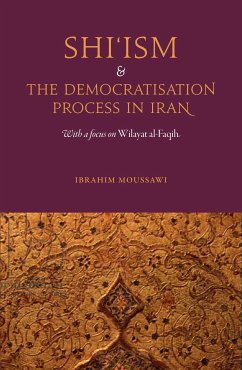Shi'ism and the Democratisation Process in Iran (eBook, ePUB)
With a Focus on Wilayat Al-Faqih


Alle Infos zum eBook verschenken

Shi'ism and the Democratisation Process in Iran (eBook, ePUB)
With a Focus on Wilayat Al-Faqih
- Format: ePub
- Merkliste
- Auf die Merkliste
- Bewerten Bewerten
- Teilen
- Produkt teilen
- Produkterinnerung
- Produkterinnerung

Hier können Sie sich einloggen

Bitte loggen Sie sich zunächst in Ihr Kundenkonto ein oder registrieren Sie sich bei bücher.de, um das eBook-Abo tolino select nutzen zu können.
Since its emergence in 1979, the Islamic Republic of Iran has remained a conundrum for observers, particularly in the West. Shi‘ism and the Democratisation Process in Iran examines the fundaments of Iran’s Islamic governance and asks the pivotal question: can democracy and Islam cohere? Addressing Wilayat al-Faqih, or rule by the jurisprudent - the theory upon which the Islamic Republic was constructed - he asserts that the system upholds both individual and communal rights, and provides scope for citizens to express their interests. Moussawi draws on the history and theological underpinnings…mehr
- Geräte: eReader
- ohne Kopierschutz
- eBook Hilfe
- Größe: 0.75MB
![Return to the Shadows (eBook, ePUB) Return to the Shadows (eBook, ePUB)]() Alison PargeterReturn to the Shadows (eBook, ePUB)11,99 €
Alison PargeterReturn to the Shadows (eBook, ePUB)11,99 €![Political Islam (eBook, ePUB) Political Islam (eBook, ePUB)]() Political Islam (eBook, ePUB)17,99 €
Political Islam (eBook, ePUB)17,99 €![Political Islam in the Global World (eBook, ePUB) Political Islam in the Global World (eBook, ePUB)]() Aini LinjakumpuPolitical Islam in the Global World (eBook, ePUB)10,00 €
Aini LinjakumpuPolitical Islam in the Global World (eBook, ePUB)10,00 €![Black Consciousness (eBook, ePUB) Black Consciousness (eBook, ePUB)]() Hlumelo BikoBlack Consciousness (eBook, ePUB)10,99 €
Hlumelo BikoBlack Consciousness (eBook, ePUB)10,99 €![GuíaBurros: Los liberales en España (eBook, ePUB) GuíaBurros: Los liberales en España (eBook, ePUB)]() Eduardo MontagutGuíaBurros: Los liberales en España (eBook, ePUB)2,99 €
Eduardo MontagutGuíaBurros: Los liberales en España (eBook, ePUB)2,99 €![Aspekte des neuen Rechtsradikalismus (eBook, ePUB) Aspekte des neuen Rechtsradikalismus (eBook, ePUB)]() Theodor W. AdornoAspekte des neuen Rechtsradikalismus (eBook, ePUB)9,99 €
Theodor W. AdornoAspekte des neuen Rechtsradikalismus (eBook, ePUB)9,99 €![The Palin Effect (eBook, ePUB) The Palin Effect (eBook, ePUB)]() Shana PearlmanThe Palin Effect (eBook, ePUB)10,99 €
Shana PearlmanThe Palin Effect (eBook, ePUB)10,99 €-
-
-
Dieser Download kann aus rechtlichen Gründen nur mit Rechnungsadresse in A, B, BG, CY, CZ, D, DK, EW, E, FIN, F, GR, H, IRL, I, LT, L, LR, M, NL, PL, P, R, S, SLO, SK ausgeliefert werden.
- Produktdetails
- Verlag: Saqi Books
- Seitenzahl: 215
- Erscheinungstermin: 30. Januar 2012
- Englisch
- ISBN-13: 9780863568312
- Artikelnr.: 38241453
- Verlag: Saqi Books
- Seitenzahl: 215
- Erscheinungstermin: 30. Januar 2012
- Englisch
- ISBN-13: 9780863568312
- Artikelnr.: 38241453
- Herstellerkennzeichnung Die Herstellerinformationen sind derzeit nicht verfügbar.
I. INTRODUCTION 1
A. One View of Democratisation 2
B. Another Perspective on Democratisation 4
C. Methodology
II. PRINCIPLES IN SHI'ITE ISLAM 8
A. Introduction 8
B. Four Sources of Islamic Law 8
1. The Qur'an 9
2. The Sunnah 10
3. Ijma' 11
4. Al-'Aql 13
C. The Problem of Succession 15
1. The Martyrdom of Imam Husayn 17
2. The pre-Occultation (Ghayba) Period 19
3. The Post-Ghayba Period 22
D. Usuli and Akhbari Schools of Shi'ite Islam 27
E. The Making and Choosing of a Marja' 29
1. Qualities of the Marja' 30
2. Choosing the Marja' 36
3. Stages of Ijtihad as a Precursor to Becoming a Marja' 37
III. BASIC PRINCIPLES: WILAYAT AL-FAQIH AND SHI'ITE JURISPRUDENCE 39
A. Four Stages of Shi'ite Jurisprudence and Wilayat Al-Faqih 39
B. Nine Theories of Wilayat al-Faqih and the Attempt to Reconcile It with
Democracy 42
C. Al-Faqih and Shura during the Greater Occultation Period 45
D. Al-Na'ini and Constitutionalism 47
1. Separation of Powers 48
2. Al- Na'ini: Miscellaneous 49
E. Religious and Political Legitimacy 54
F. Wilayat al-Faqih and Wilayat al-Umma 55
1. Legitimisation of Wilayat al-Faqih 58
2. Dialectics on Imama in Wilayat al-Faqih 58
3. Three Pillars of Wilayat al-Faqih 59
a. The Need of Muslims for A Government 59
b. The Meaning of the Wilayat al-Faqih and the Limitations of this Wilaya
62
c. The Meaning of Islamic Government 62
4. Evaluation of Wilayat al-Faqih 63
5. Wilayat al-Faqih in the Islamic Republic 65
6. Tabataba'i and Maghniyye's Views 70
7. Debates on Wilayat al-Faqih 71
8. Imam Khumayni's Theory and Implications 74
a. Political Freedom 74
b. Islamic Shura Council and the Council of Experts 75
c. Taklif 75
d. Islam Is More Sublime Than All Democracies 76
e. There Is No Legitimacy without Islam 77
f. The Salient Characteristics of Waliyat al-Faqih 77
IV. DEMOCRATISATION PROCESSES IN THE ISLAMIC REPUBLIC OF IRAN: THE ROLE OF
SHURA IN THE DEMOCRATISATION PROCESS 79
A. Background on Shura 79
1. Is Shura a Democratic Practice? 81
2. Democracy Is Not Shura 83
3. Shura in Islam: The Intellectual and Jurisprudential Stance of Shura 84
4. Shura and Wilaya 86
5. Qur'anic Legitisation of Shura 93
6. Secularism and Democracy 97
B. The Dilemma of Democracy in Contemporary Islamic Political Thought 100
1. Sayyid Muhammad Baqir al-Sadr 103
2. Shaykh Muhammad Mahdi Shamseddine on Shura 106
3. Imam Khumayni on Shura 107
C. The Concept of Shura and Its Positioning In the Islamic Order 109
V. ISLAMIC PRINCIPLES APPLIED IN THE ISLAMIC REPUBLIC 110
A. The Concept of Shura and its Positioning in the Islamic Order 110
B. Shura Councils in the Islamic Republic of Iran 112
D. The Role of the Umma in the Islamic System 116
E. The Necessity of Ikhtilaf 121
F. The Conception of Maslaha 124
1. The Stance of Maslaha in Jurisprudence 125
2. Wilayat and Maslaha 126
4. The Expediency Council (Majlis Tashkhis Al-Maslaha) 127
5. Practical Dimension of Maslaha 129
6. Maslaha and Democratisation 134
VI. DOES WILAYAT AL-FAQIH LEAD TO TYRANNY? 136
A. Background 136
B. Wilayat al-Faqih: The Problematic 137
1. Discussions and Debates on Wilayat al-Faqih Vis-à-Vis Tyranny 139
2. The Islamic System and the Stance from Despotism 143
3. Constitutional Safeguards against Despotism 148
4. Prerogatives of the Wali al-Faqih: A Comparison 154
C. Populace and Islam 158
D. The Democratic Nature of Islam 159
E. Safety Valves and Constitutional Prohibitions against the Dictatorship
of the Ruler 164
F. The Imamate as a Continuation of Prophethood 172
G. Conclusion 175
VII. ISLAMISM AND REPUBLICANISM 176
A. Background 176
B. The Drafting of the Constitution 176
C. The Establishment of the Constitution in its Own Right 179
D. The Concepts of Republicanism and Islamism in the Islamic Republic 183
1. The Background to the Formation of the Islamic Republic 186
2. Is there Any Contradiction between the Two Concepts of "Republicanism"
and "Islamism", or Is It Possible to Fuse them Together? 187
3. Republicanism and Islamism in the Constitution of the Islamic Republic
190
4. The Apparent Contradiction between Republicanism and Islamism 192
5. Divergence between Wilayat al-Faqih and Republican Government 193
6. The Concordance between Islamism and Republicanism 195
7. How Can We Reconcile between Islamism and Republicanism? 199
E. Conclusion 203
F. Final Word: Practical Application 205
VIII. DEMOCRATISATION IN THE ISLAMIC REPUBLIC OF IRAN: CASE STUDY 208
A. The Dual Legitimacy of the Islamic Republic 209
B. New Discourses on the State's Islamic Legitimacy 214
C. New Discourses on Wilayat al Faqih 216
D. New Discourses on the Council of Guardians 218
E. New Discourses on Women's Rights in the Islamic Republic 220
F. New Discourses on the Outlook of the Islamic Republic 223
G. Battle Lines between Reformists and Conservatives 225
H. The Limits Khatami's Reforms 228
I. New Alliances, New Possibilities 232
J. Is Democratisation Taking Place in Iran? 235
IX. CONCLUSION 240
BIBLIOGRAPHY 245
I. INTRODUCTION 1
A. One View of Democratisation 2
B. Another Perspective on Democratisation 4
C. Methodology
II. PRINCIPLES IN SHI'ITE ISLAM 8
A. Introduction 8
B. Four Sources of Islamic Law 8
1. The Qur'an 9
2. The Sunnah 10
3. Ijma' 11
4. Al-'Aql 13
C. The Problem of Succession 15
1. The Martyrdom of Imam Husayn 17
2. The pre-Occultation (Ghayba) Period 19
3. The Post-Ghayba Period 22
D. Usuli and Akhbari Schools of Shi'ite Islam 27
E. The Making and Choosing of a Marja' 29
1. Qualities of the Marja' 30
2. Choosing the Marja' 36
3. Stages of Ijtihad as a Precursor to Becoming a Marja' 37
III. BASIC PRINCIPLES: WILAYAT AL-FAQIH AND SHI'ITE JURISPRUDENCE 39
A. Four Stages of Shi'ite Jurisprudence and Wilayat Al-Faqih 39
B. Nine Theories of Wilayat al-Faqih and the Attempt to Reconcile It with
Democracy 42
C. Al-Faqih and Shura during the Greater Occultation Period 45
D. Al-Na'ini and Constitutionalism 47
1. Separation of Powers 48
2. Al- Na'ini: Miscellaneous 49
E. Religious and Political Legitimacy 54
F. Wilayat al-Faqih and Wilayat al-Umma 55
1. Legitimisation of Wilayat al-Faqih 58
2. Dialectics on Imama in Wilayat al-Faqih 58
3. Three Pillars of Wilayat al-Faqih 59
a. The Need of Muslims for A Government 59
b. The Meaning of the Wilayat al-Faqih and the Limitations of this Wilaya
62
c. The Meaning of Islamic Government 62
4. Evaluation of Wilayat al-Faqih 63
5. Wilayat al-Faqih in the Islamic Republic 65
6. Tabataba'i and Maghniyye's Views 70
7. Debates on Wilayat al-Faqih 71
8. Imam Khumayni's Theory and Implications 74
a. Political Freedom 74
b. Islamic Shura Council and the Council of Experts 75
c. Taklif 75
d. Islam Is More Sublime Than All Democracies 76
e. There Is No Legitimacy without Islam 77
f. The Salient Characteristics of Waliyat al-Faqih 77
IV. DEMOCRATISATION PROCESSES IN THE ISLAMIC REPUBLIC OF IRAN: THE ROLE OF
SHURA IN THE DEMOCRATISATION PROCESS 79
A. Background on Shura 79
1. Is Shura a Democratic Practice? 81
2. Democracy Is Not Shura 83
3. Shura in Islam: The Intellectual and Jurisprudential Stance of Shura 84
4. Shura and Wilaya 86
5. Qur'anic Legitisation of Shura 93
6. Secularism and Democracy 97
B. The Dilemma of Democracy in Contemporary Islamic Political Thought 100
1. Sayyid Muhammad Baqir al-Sadr 103
2. Shaykh Muhammad Mahdi Shamseddine on Shura 106
3. Imam Khumayni on Shura 107
C. The Concept of Shura and Its Positioning In the Islamic Order 109
V. ISLAMIC PRINCIPLES APPLIED IN THE ISLAMIC REPUBLIC 110
A. The Concept of Shura and its Positioning in the Islamic Order 110
B. Shura Councils in the Islamic Republic of Iran 112
D. The Role of the Umma in the Islamic System 116
E. The Necessity of Ikhtilaf 121
F. The Conception of Maslaha 124
1. The Stance of Maslaha in Jurisprudence 125
2. Wilayat and Maslaha 126
4. The Expediency Council (Majlis Tashkhis Al-Maslaha) 127
5. Practical Dimension of Maslaha 129
6. Maslaha and Democratisation 134
VI. DOES WILAYAT AL-FAQIH LEAD TO TYRANNY? 136
A. Background 136
B. Wilayat al-Faqih: The Problematic 137
1. Discussions and Debates on Wilayat al-Faqih Vis-à-Vis Tyranny 139
2. The Islamic System and the Stance from Despotism 143
3. Constitutional Safeguards against Despotism 148
4. Prerogatives of the Wali al-Faqih: A Comparison 154
C. Populace and Islam 158
D. The Democratic Nature of Islam 159
E. Safety Valves and Constitutional Prohibitions against the Dictatorship
of the Ruler 164
F. The Imamate as a Continuation of Prophethood 172
G. Conclusion 175
VII. ISLAMISM AND REPUBLICANISM 176
A. Background 176
B. The Drafting of the Constitution 176
C. The Establishment of the Constitution in its Own Right 179
D. The Concepts of Republicanism and Islamism in the Islamic Republic 183
1. The Background to the Formation of the Islamic Republic 186
2. Is there Any Contradiction between the Two Concepts of "Republicanism"
and "Islamism", or Is It Possible to Fuse them Together? 187
3. Republicanism and Islamism in the Constitution of the Islamic Republic
190
4. The Apparent Contradiction between Republicanism and Islamism 192
5. Divergence between Wilayat al-Faqih and Republican Government 193
6. The Concordance between Islamism and Republicanism 195
7. How Can We Reconcile between Islamism and Republicanism? 199
E. Conclusion 203
F. Final Word: Practical Application 205
VIII. DEMOCRATISATION IN THE ISLAMIC REPUBLIC OF IRAN: CASE STUDY 208
A. The Dual Legitimacy of the Islamic Republic 209
B. New Discourses on the State's Islamic Legitimacy 214
C. New Discourses on Wilayat al Faqih 216
D. New Discourses on the Council of Guardians 218
E. New Discourses on Women's Rights in the Islamic Republic 220
F. New Discourses on the Outlook of the Islamic Republic 223
G. Battle Lines between Reformists and Conservatives 225
H. The Limits Khatami's Reforms 228
I. New Alliances, New Possibilities 232
J. Is Democratisation Taking Place in Iran? 235
IX. CONCLUSION 240
BIBLIOGRAPHY 245







